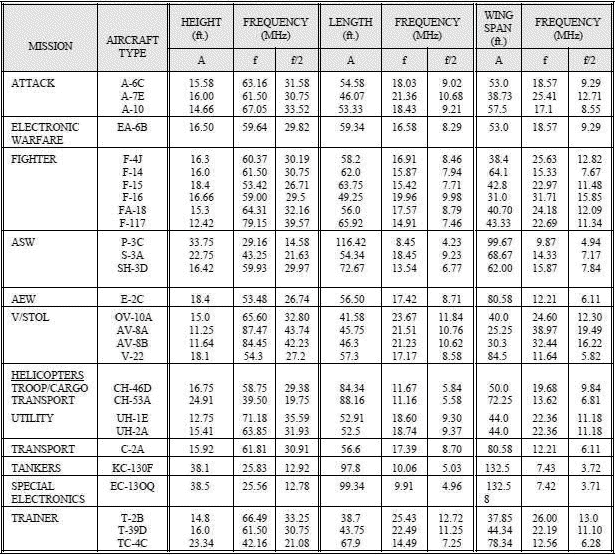|
[Go to TOC]
EMP / AIRCRAFT DIMENSIONS
An aircraft flying in the vicinity of an electromagnetic pulse (EMP) acts like a receiving antenna and
picks up EMP radiation in relation to size like a dipole (or half-wavelength dipole). The electromagnetic pulse
spectrum decreases above 1 MHz as shown in Figure 1, so an F-14 aircraft that is an optimum ½ wavelength antenna
at ~8 MHz will pick up less EMP voltage than a B-52 or an aircraft with a trailing wire antenna. A rule of thumb
for the voltage picked up is : VEMP = 8.1 volts/ft times the maximum dimension of the aircraft in feet
This rule of thumb was generated because a single linear relationship between voltage and aperture seemed to exist
and compared favorably with more complex calculations for voltage picked up by various aircraft when subjected to
EMP. Table 1 shows various aircraft and the frequencies they would be most susceptible to, using f = c/8,
where 8 matches the selected aircraft dimension for maximum "antenna reception effect". This should be a design
consideration when trying to screen onboard avionics from the effects of EMP. The
following is a partial listing of aircraft types vs identifying prefix letters (several are used in Table 1):
| A Attack B Bomber C Cargo E Electronic Surveillance
F Fighter H Helicopter |
K Tanker O Observation P Patrol Q Special mission R Reconnaissance S Anti
Sub/Ship |
T Trainer U Utility V Vertical or Short Takeoff and Landing (V/STOL) X
Experimental Y Prototype |

Figure 1. EMP as a Function of Frequency
Table 1. AIRCRAFT DIMENSIONS AND EQUIVALENT ANTENNA APERTURE

Table of Contents for Electronics Warfare and Radar Engineering Handbook
Introduction |
Abbreviations | Decibel | Duty
Cycle | Doppler Shift | Radar Horizon / Line
of Sight | Propagation Time / Resolution | Modulation
| Transforms / Wavelets | Antenna Introduction
/ Basics | Polarization | Radiation Patterns |
Frequency / Phase Effects of Antennas |
Antenna Near Field | Radiation Hazards |
Power Density | One-Way Radar Equation / RF Propagation
| Two-Way Radar Equation (Monostatic) |
Alternate Two-Way Radar Equation |
Two-Way Radar Equation (Bistatic) |
Jamming to Signal (J/S) Ratio - Constant Power [Saturated] Jamming
| Support Jamming | Radar Cross Section (RCS) |
Emission Control (EMCON) | RF Atmospheric
Absorption / Ducting | Receiver Sensitivity / Noise |
Receiver Types and Characteristics |
General Radar Display Types |
IFF - Identification - Friend or Foe | Receiver
Tests | Signal Sorting Methods and Direction Finding |
Voltage Standing Wave Ratio (VSWR) / Reflection Coefficient / Return
Loss / Mismatch Loss | Microwave Coaxial Connectors |
Power Dividers/Combiner and Directional Couplers |
Attenuators / Filters / DC Blocks |
Terminations / Dummy Loads | Circulators
and Diplexers | Mixers and Frequency Discriminators |
Detectors | Microwave Measurements |
Microwave Waveguides and Coaxial Cable |
Electro-Optics | Laser Safety |
Mach Number and Airspeed vs. Altitude Mach Number |
EMP/ Aircraft Dimensions | Data Busses | RS-232 Interface
| RS-422 Balanced Voltage Interface | RS-485 Interface |
IEEE-488 Interface Bus (HP-IB/GP-IB) | MIL-STD-1553 &
1773 Data Bus | This HTML version may be printed but not reproduced on websites.
|










